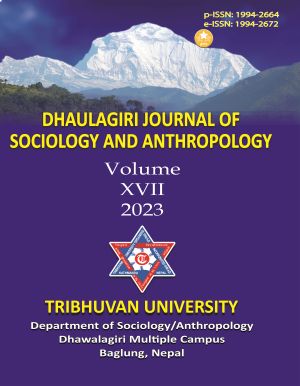Indigenous Rodhi Culture of Gurung and Factors of its Transform at Ghandruk Kaski in Nepal
DOI:
https://doi.org/10.3126/dsaj.v17i01.61145Keywords:
change, ghandruk, globalization, native, rodhiAbstract
The Rodhi, a traditional cultural practice in Nepal, has lost its native form in recent years. It was popular in the Gurung community in Ghandruk, however, it is being transformed into a modern form popular in restaurants. This decline in native Rodhi is attributed to factors such as globalization, modern entertainment tools, and the shift from agriculture and animal rearing to films and dance bars. The study used qualitative data collection methods and an ethnographic study to analyze the changes in Rodhi culture. Twenty-seven participants were selected for the study, and data was collected through interviews, observations, narratives, discussions, and case studies. The findings revealed that modern entertainment tools, such as films, dance bars, Hindi and English films, hybrid music, and contemporary songs, have diverted the audience and participants from Rodhi's originality to youths. Globalization has led to cultural assimilation, with Gurungs being enlisted in services in Singapore police, Brunei reserve troops, French, British, and Indian armies have less prioritized Rodhi. Globalization encourages immigration, contemporary communication, mass media, overseas employment, cultural assimilation, and shifting traditional occupations. Cultural assimilation due to globalization confined Rodhi to nightclubs, affecting the traditional language and Rodhi culture among the Gurung community of Ghandruk. Cultural assimilation and socio-cultural effects contribute to the declination of traditional knowledge, local culture, and cultural identities like Rodhi. This study has implications for the preservation and promotion of traditional culture, benefiting cultural practitioners, activists, academicians, future researchers, and policymakers.
Downloads
Downloads
Published
How to Cite
Issue
Section
License
Copyright (c) 2023 Saroj Raj Panta

This work is licensed under a Creative Commons Attribution-NonCommercial-ShareAlike 4.0 International License.




